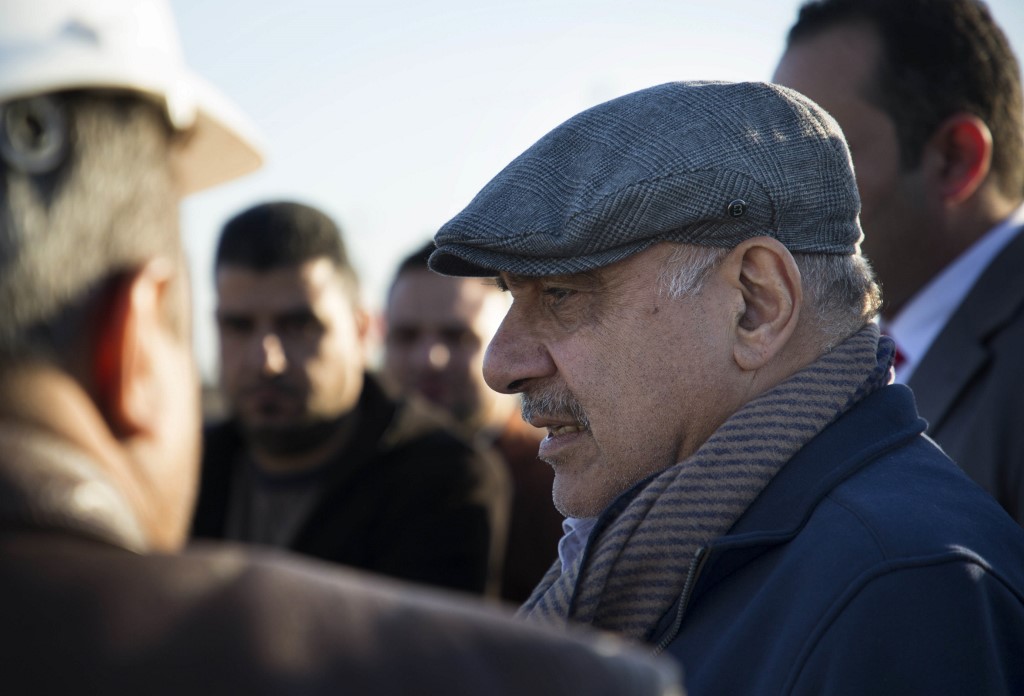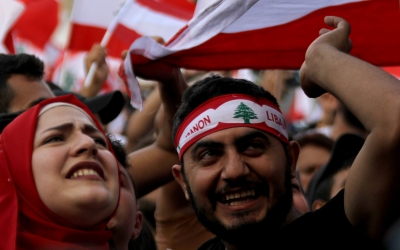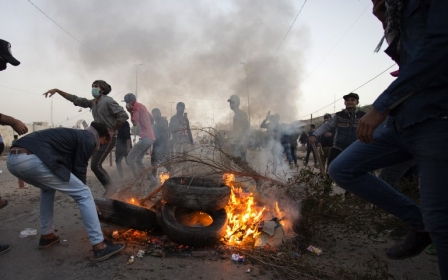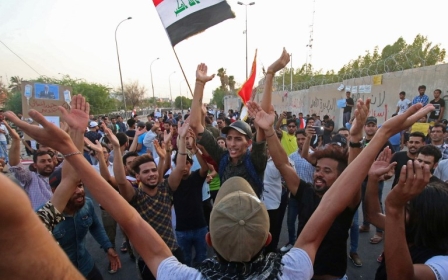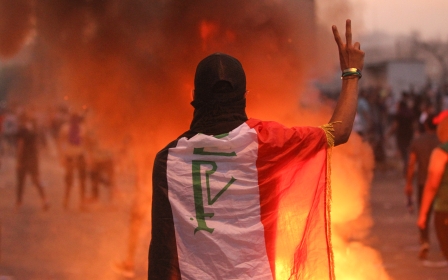Empty promises by Iraq's government fuel rage in the streets
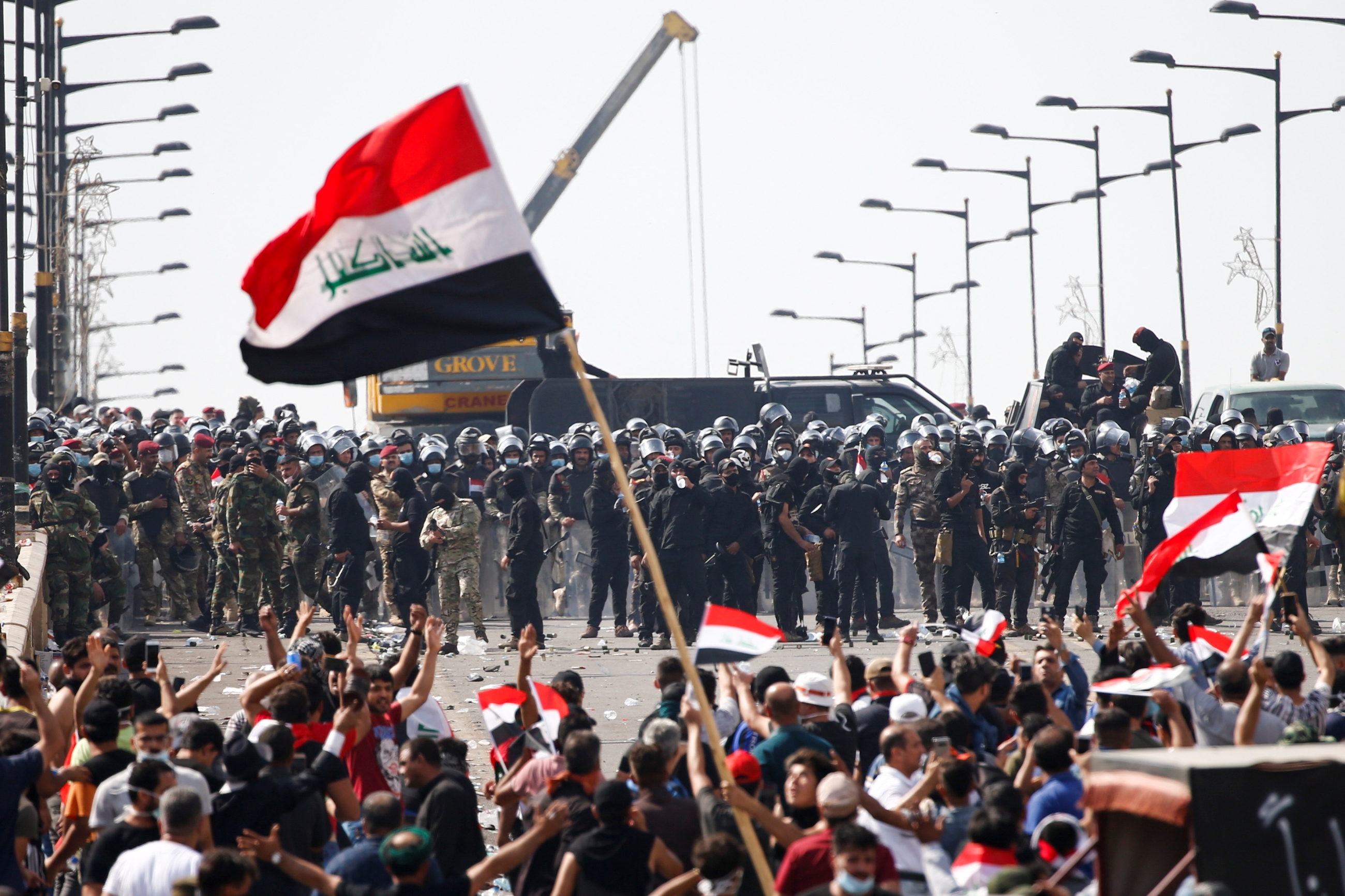
Iraq’s ongoing popular protests have revealed that the only institution keeping the country’s current government intact is its parliament.
The influential political players controlling the country’s multi-headed power structure are engaged in a violent struggle, with each vying for wider representation in the Council of Representatives. The ethno-sectarian quota system, which was introduced into Iraqi politics in 2003, remains an overpowering factor.
Yet, the true power of Iraq’s political system lies with the various armed groups that support it and brutally point their weapons at those who protest against it.
Clashing factions
Due to the holy trinity representing the sectarian and ethnic divisions in Iraq - Sunni, Shia and Kurds - democracy in the country appears fragile and weak, and does not accurately represent public opinion. What it represents instead is the strength of the clashing factions and their regional and international support.
New MEE newsletter: Jerusalem Dispatch
Sign up to get the latest insights and analysis on Israel-Palestine, alongside Turkey Unpacked and other MEE newsletters
The current administration led by Prime Minister Adel Abdul Mahdi is one of the worst iterations of the governing body since 2003, born from a consensus between local forces supported by regional players, such as Iran and the US.
This is a key factor that explains the government's resounding failure just a year after its formation and the outbreak of heated protests, which the government quashed with excessive force, killing dozens and wounding thousands.
Citizens' votes were effectively lost, leading to a sense of hopelessness
Former Prime Minister Haider al-Abadi had his ambitions for a second term quashed by the angry, bloody and violent protests in Basra in 2018. The government faced a terrifying dilemma, as this was the first time protesters had expressed their opposition by setting alight the headquarters of Iran-backed parties and the consulate, viewed as symbols of foreign intervention and corruption.
When Abdul Mahdi came into office, forces within the government had already begun colliding with one another due to rivalries and the rejection of the May 2018 election results. Deliberate acts of sabotage hit the ballot boxes, and armed attacks against party institutes expressed the deep hostility between Iraq’s ruling forces.
Destroying trust
When Abdul Mahdi’s government was formed in October 2018, with a cabinet that was still incomplete, he did not heed public opinion or the country's desire for change. As a result, citizens’ votes were effectively lost, leading to a sense of hopelessness and shattered trust.
So, how can a power that does not believe in change deal transparently with the demands of groups of angry youth?
During the 2018 legislative polls, young people led a movement to boycott the elections, reflecting a general malaise and disillusion with the current political leadership.
The regime failed to protect its legitimacy through democratic participation, and now it has lost it completely by its use of deadly force in an effort to curb opposition voices, all amid a media blackout, internet shutdown and the imposition of curfews.
The protests are the only real representation of “democracy” in Iraq, and they are being brutally suppressed.
After four failed electoral experiences in 2005, 2010, 2014 and 2018, Iraqis no longer believe that the ballot box will guarantee their rights, end corruption or fix the problems in the government.
In the 16 years since Iraqis rid themselves of the repressive regime of Saddam Hussein, they have found themselves confronting an even more repressive and corrupt system. The security apparatus considers any call for protests to be a “conspiracy” that requires the killing of protesters.
Taken by surprise
The government appears to have been surprised by the large numbers of angry youth rallying in Iraq’s streets and squares, calling for its downfall. The courage of Iraq’s youth has broken the barrier of fear, but the horrific consequence was a hail of bullets, leading some to question why the youth did not simply turn tail and run.
The answer is deeply rooted despair. The only choice these youths have is to commit suicide as a means of individual protest, or to demonstrate in the form of mass suicide, confronting a repressive power and the brutality of the state in order to publicly reject the continuation of the regime.
Iraq is a young country, and its democratic composition is not fixed. Young, revolutionary Iraqis suffer from unemployment, deprivation and hopelessness, fuelling a rapid increase in suicides over the past three years.
Almost 200 people took their own lives in Iraq in the first four months of 2019, according to the government's Human Rights Commission.
This follows a rise in suicides from 383 in 2016 to 519 last year recorded by the parliament's human rights committee.
This political crisis has intensified as the immediate security threat posed by al-Qaeda, Islamic State (IS) and other armed groups has subsided. Now, Iraqis are confronting the collapse of public services, dwindling energy resources, inflation, declining revenues and growing corruption.
Unemployment has reached 16 percent, and the poverty rate is high, at 23 percent nationally - and nearly double that in cities that were affected by IS.
Vulnerable to future shocks
The complex economic situation in Iraq makes the country vulnerable to future shocks, as demand grows for stronger government services. The lack of resources has been met with widespread corruption in government institutions, alongside the legalised corruption economy run by armed factions. Hundreds of billions of dollars in public money is estimated to have been wasted through corruption since 2003.
By the end of 2018, Iraq's debts was expected to reach $132bn, leaving the country unable to pursue development projects or to modernise infrastructure, all amid declining oil sales.
The problem lies in the mindset of a regime that tries to acquire calm by bribing the poor with empty promises
Earlier this month, as his country drowned in a river of blood, Abdul Mahdi came forward with a package of promises aimed at calming the situation. Instead, it stoked anger in the streets, outlining targets that were impossible to achieve, such as the offer of pensions to families without an income, or the distribution of residential plots to the poor and loans to young people.
The problem lies in the mindset of a regime that tries to acquire calm by bribing the poor with empty promises. The underprivileged know that the government is incapable of fulfilling such promises, in view of its ongoing depletion of wealth and deeply entrenched corruption.
The views expressed in this article belong to the author and do not necessarily reflect the editorial policy of Middle East Eye.
This article is available in French on Middle East Eye French edition.
Middle East Eye delivers independent and unrivalled coverage and analysis of the Middle East, North Africa and beyond. To learn more about republishing this content and the associated fees, please fill out this form. More about MEE can be found here.



